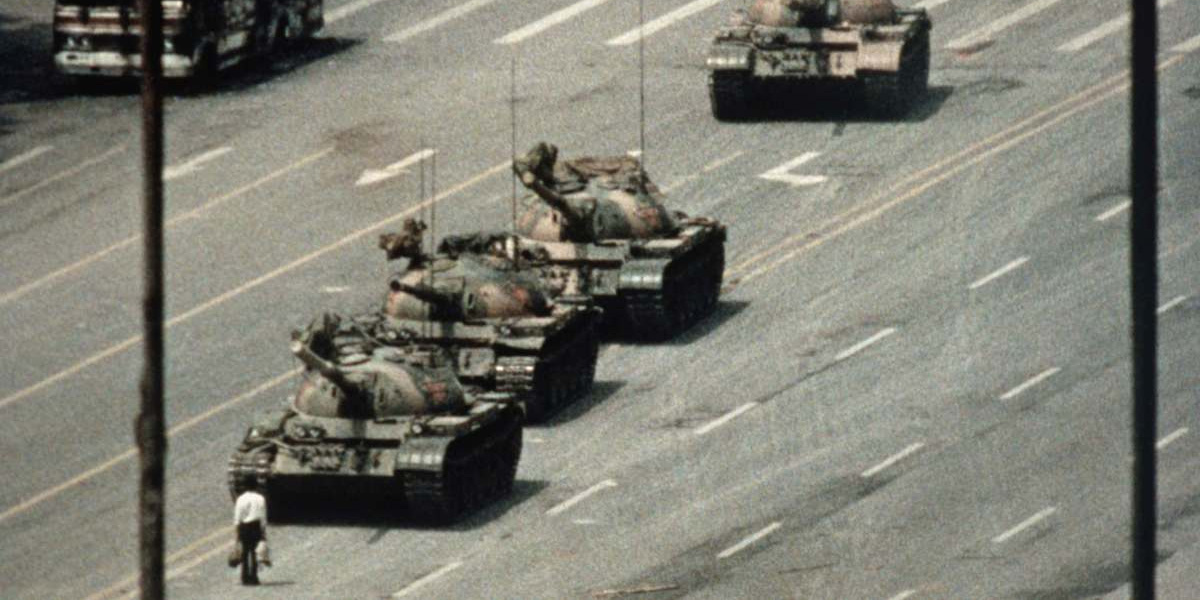This article appeared as an op-ed in National Review.
An armed citizenry could have prevented the Tiananmen Square massacre.
I was born in Chengdu, China. When I was growing up, the Communist Party controlled everything. There were no choices of any sort. We were all poor except the elite. The local government rationed everything from pork to rice, sugar, and flour because there were not enough supplies. We were allowed only a kilogram of pork per month for our family of five. We lived in two rooms, without heat in the winter. I got impetigo during the cold, humid winters. There were eight families living around our courtyard, and we all had to share one bathroom (a hole in the ground) for males, one for females. We had only government-run medical clinics, where the conditions were filthy and services were horrible. I was afraid of going there because I might get some other infectious diseases.
As children, we were brainwashed in school every day. We chanted daily: “Long Live Chairman Mao, Long Live the Communist Party.” I loved Chairman Mao. I was so brainwashed that I could see Chairman Mao in the clouds and fire. He was like a god to me. The powerful government watched us very closely, from the Beijing central government to our Communist block committees and local police stations. We had no rights, even though our constitution said we did.
It was frightening that local police could stop by our home to pound on the doors at night and search us for no good reason. People were arrested without court papers and locked up for months without trials.
Citizens were not allowed to have any guns or they would be put into prison, or worse. Chinese people were helpless when they needed to defend themselves. I grew up with fear, like millions of other children — fear that the police would pound on our doors at night and take my loved ones away, fear that bad guys would come to rob us. Sometimes I could not sleep from hearing the screaming people outside.
There were many stories of local people defending themselves with kitchen knives and sticks. Women were even more helpless when they were attacked and raped. I was molested as a college student once while walking home at night. It was common then.
When it came to dealing with the Chinese government and police brutality, there was nothing we could do. They had guns, while law-abiding citizens did not.
We could not vote. No elections back then. The party appointed all the officials. Remember the Tiananmen Square massacre in 1989? Thousands of students were killed by our own soldiers, who followed orders from the top leaders in Beijing. The local residents supported the students but had no means to help them. What if the residents and students had had guns? What if there had been a militia in China at that time? History might have been different.
Even though things have changed a lot in China since the open-door policy, the political system is still fundamentally the same: one-party rule. After I went to law school, and later joined a law-school faculty, I was depressed to know that what we learned and taught in school and what was reality were such different things. The society ruled not by law but by men.
Citizens still cannot buy firearms today. I remember that when I traveled to Guangdong province for business in 1997 and 1998, the residents called the local police “gangsters.” Whenever the police showed up, the residents would hide.
After I joined the law-school faculty in Fudan University, I had to be careful about what I said in the classroom and during the party’s political-study time. My boss in law school even intruded into my private life, telling me that I received too many letters; I was too social. I should not go to my boyfriend’s parents’ house for dinner and spend the night.
I realized I could not really have the personal freedom I dreamed of if I stayed in China, so I decided to come over to the U.S.A. to study. It was a long and stressful process for me to leave. I went to the local security office to apply for my passport seven times and was treated as a deserter, with papers thrown at my face. My law school made me sign a document saying that I would return to my job in Shanghai after two years of graduate study or they would eliminate my position and send all of my papers to my hometown in Chengdu, where I would be forced to go when I returned. I was determined to leave and did not care what they made me sign.
I finally made it to America in 1988 with $100 in my pocket. The first ten years when I was in the U.S., I still had nightmares about being trapped in China by the government. I dreamed often that I had to dig a big hole in the ground, into the blue Pacific Ocean, so I could escape, jump into the ocean, and swim to the States.
Even when I went back to visit China in 1991 with my American husband, and we stayed at a friend’s apartment in Beijing, the police came to pound the door one night, wanting to check our papers. Someone must have reported to them that there was a foreigner in the neighborhood. I was pregnant with our first boy; we were in deep sleep after midnight when the pounding noise terrified me and brought all the childhood memories back.
My father was required to apply for a permit to let my husband stay in my parents’ home for a three-month visit. Everyone in China today has a resident ID. You cannot just move to anywhere you see fit without permission. You cannot even get married and have a baby without application and approval from your employer (work unit). Isn’t it interesting how statist governments everywhere use companies to control people?
It is scary when law-abiding citizens have no privacy and no means to defend themselves. One time I was in China on June 4, the anniversary of Tiananmen Square, for a business trip. I was in my friend’s car around midnight. Local police pulled us over to check our ID and search our car. They did not have to show any search warrant.
I tried so hard to come to the U.S. for personal freedom, including the freedom guaranteed by the Second Amendment: the right to keep and bear arms, which makes me feel like a free person, not a slave. I felt empowered when I finally held my own gun. For the first time in my life, I truly knew I was free.
I think the Founding Fathers of this country were very wise. They put that in the Constitution because they knew that a government could become either powerful or weak and that the citizens’ last defense is the ability to bear arms to protect themselves against tyranny and criminals. The guns are not just for sports, hunting, and collecting; it is our fundamental right to bear arms and use them for our self-defense.
Having previously lived under a tyranny, it seems clear to me that the U.S. government is going to try to infringe my Second Amendment right. What happened in China could happen in America. If the government can tell us what arms to bear, where to bear them, and how many shots you need to use to defend yourself, we might just become slaves. America is the land of the free and the last hope for human freedom. Do not give up. We have to be united and fight back for the sake of our children and grandchildren.

